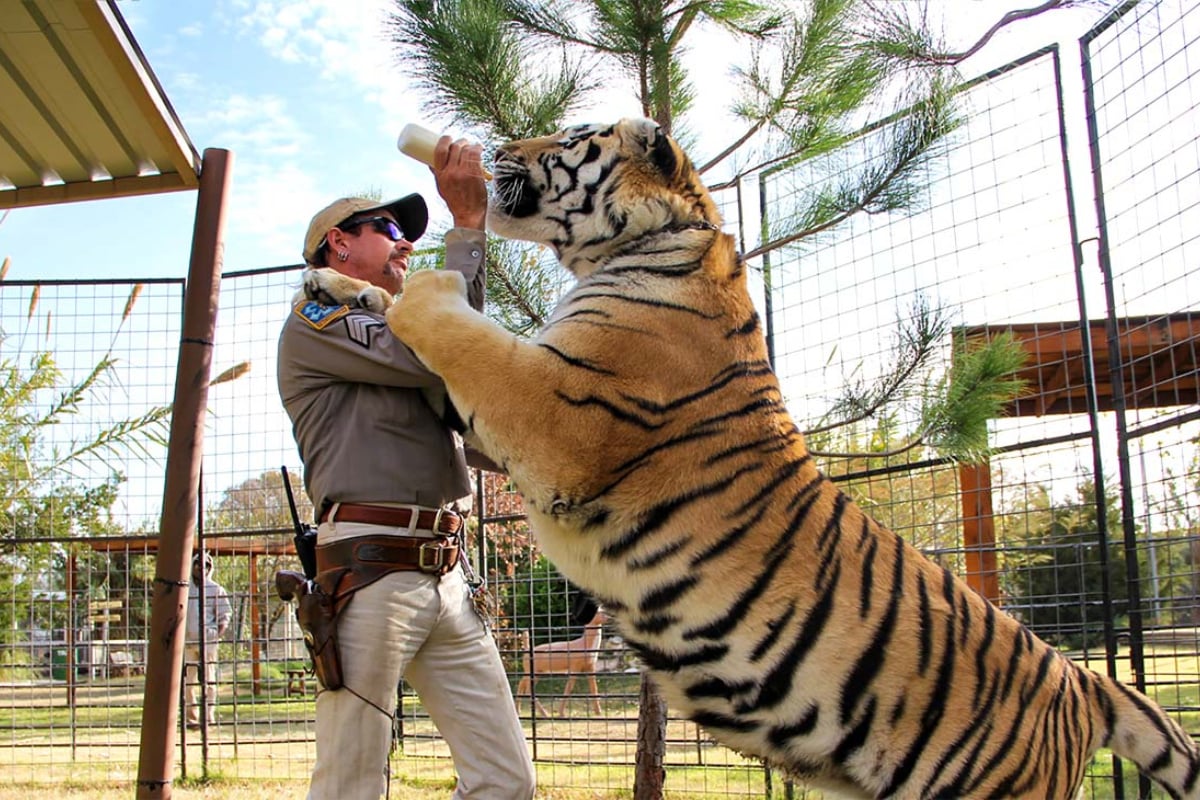In the realm of modern entertainment, few phenomena have captured the public imagination quite like *Tiger King: Murder, Mayhem, and Madness*. Released on Netflix, this docuseries has become a cultural touchstone, offering viewers an eccentric blend of crime, intrigue, and the exotic world of big cat ownership. However, despite its pop culture status, a pressing concern lurks beneath the surface: is *Tiger King* merely an enthralling spectacle, or is it, in fact, a poignant commentary on the insidious nature of animal cruelty disguised as entertainment?
The series presents itself as an unvarnished look at the lives of big cat enthusiasts, primarily focusing on Joe Exotic—a flamboyant tiger breeder with a personality as audacious as his exploits. Viewers are drawn to the drama, reveling in the outrageous antics and personal feuds that unfold. Yet, a critical observation arises: the fascination with such peculiar characters often overshadows the more disturbing realities faced by the animals at the center of this tempestuous narrative.
At the core of *Tiger King* lies the exploitation of big cats, representing a broader trend often observed in the world of exotic animals. Individuals like Joe Exotic operate in a precarious ethical gray zone, maintaining a façade of passion for wildlife while engaging in practices that can only be deemed cruel. The breeding and selling of big cats—facilitated by a lack of regulatory oversight—underscore the commodification of living beings, reducing majestic creatures to mere props for entertainment.
This commodification is, in many ways, symptomatic of a deeper cultural malaise. Our society increasingly craves novelty and sensationalism, a hunger that can lead to the fortuitous disregard for the welfare of animals. It prompts us to question: why are we so captivated by figures like Joe Exotic? The answer reveals uncomfortable truths about our fascination with the macabre and the avant-garde. It is an innate human tendency to be drawn to the bizarre and the taboo, often eclipsing our ethical considerations.
As the series progresses, it becomes painfully apparent that the lives of these big cats are often fraught with peril. Scenes depicting tigers confined to cramped enclosures, devoid of the space they require to thrive, evoke an unsettling realization. The superficial charm of these large cats, alongside their playful interaction with humans, belies the grim reality of their lives. Positioned as symbols of power and prestige, their exploitation raises critical ethical questions regarding our relationship with the animal kingdom.
Moreover, the narrative constructs a paradox: while we thrill at the peculiarities of the cast, we simultaneously condone the very cruelty that begets their existence. The allure of exotic pets is compounded by a societal obsession with the extraordinary. Big cats, with their imposing stature and enigmatic presence, offer an adrenaline-packed escapade that draws an audience, even as these wild beings suffer fundamentally. This unsettling dichotomy highlights our collective complicity in perpetuating the cycle of abuse that permeates the world of exotic animal ownership.
The accessibility of *Tiger King* on a prominent streaming platform raises additional ethical concerns. When entertainment seamlessly intertwines with exploitative practices, the consequences can be far-reaching. Viewers often exit the screen with an insatiable curiosity to learn more about their newfound obsessions, inadvertently normalizing the idea of big cat ownership while dismissing the ethical implications. This normalized portrayal can skew public perception, creating a dangerous precedent that dismisses the issues of animal welfare in exchange for sensationalism.
In examining the broader societal implications of *Tiger King*, we must confront our own roles as spectators. The show serves as a microcosm of a larger societal issue—the appetite for thrill and sensationalism often masks the grim realities faced by those who cannot voice their suffering. It demonstrates how we can unwittingly participate in cycles of violence against animals, galvanizing our consumption of their stories while neglecting the essential ethical questions surrounding their treatment.
To navigate these tumultuous waters, a collective reevaluation of our values surrounding entertainment and animal welfare is necessary. It demands vigilance against the lingering allure of exotic animals and the superficial representations of their plight through media. Rather than viewing *Tiger King* as an isolated incident, it must serve as a catalyst for broader discussions on the ethics of animal representation in entertainment and the responsibilities that come with it.
This discourse surrounding *Tiger King* inevitably leads to the consideration of advocacy. Organizations committed to ending the exploitation of wild animals must be amplified, promoting awareness that counteracts both ignorance and apathy. The tide can be turned if we collectively uplift voices that advocate for animal rights, demanding systemic changes that eradicate abusive practices inherent in the exotic animal trade.
Ultimately, *Tiger King* is more than a mere spectacle—it is a reflection of our values and the uncomfortable truths stemming from our consumption patterns. As we indulge in the wild allure of such narratives, we must remain cognizant of the ethical ramifications. The call to action lies firmly within our grasp, prompting us to advocate for the voiceless and critically assess our role in the narrative of animal welfare, ensuring that entertainment does not perpetuate cruelty but rather fosters compassion and respect for all living beings.








